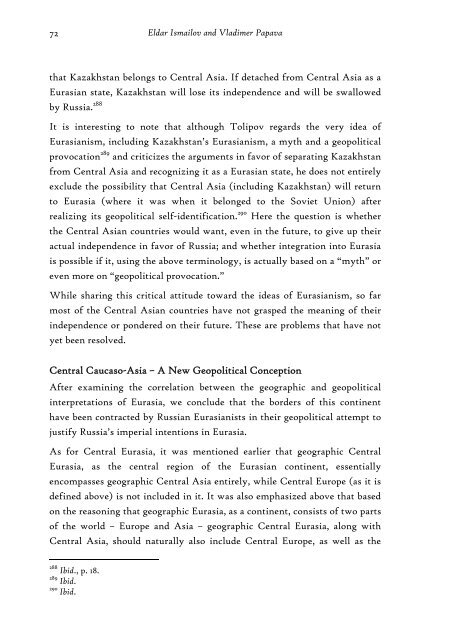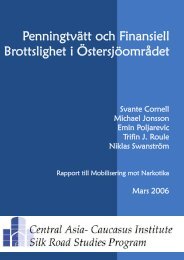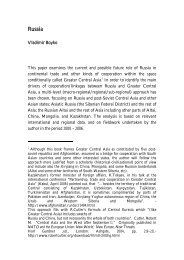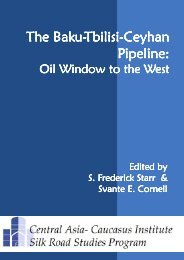Eurasianism and the Concept of Central Caucaso-Asia
Eurasianism and the Concept of Central Caucaso-Asia
Eurasianism and the Concept of Central Caucaso-Asia
You also want an ePaper? Increase the reach of your titles
YUMPU automatically turns print PDFs into web optimized ePapers that Google loves.
72<br />
Eldar Ismailov <strong>and</strong> Vladimer Papava<br />
that Kazakhstan belongs to <strong>Central</strong> <strong>Asia</strong>. If detached from <strong>Central</strong> <strong>Asia</strong> as a<br />
Eurasian state, Kazakhstan will lose its independence <strong>and</strong> will be swallowed<br />
by Russia. 288<br />
It is interesting to note that although Tolipov regards <strong>the</strong> very idea <strong>of</strong><br />
<strong>Eurasianism</strong>, including Kazakhstan’s <strong>Eurasianism</strong>, a myth <strong>and</strong> a geopolitical<br />
provocation 289 <strong>and</strong> criticizes <strong>the</strong> arguments in favor <strong>of</strong> separating Kazakhstan<br />
from <strong>Central</strong> <strong>Asia</strong> <strong>and</strong> recognizing it as a Eurasian state, he does not entirely<br />
exclude <strong>the</strong> possibility that <strong>Central</strong> <strong>Asia</strong> (including Kazakhstan) will return<br />
to Eurasia (where it was when it belonged to <strong>the</strong> Soviet Union) after<br />
realizing its geopolitical self-identification. 290 Here <strong>the</strong> question is whe<strong>the</strong>r<br />
<strong>the</strong> <strong>Central</strong> <strong>Asia</strong>n countries would want, even in <strong>the</strong> future, to give up <strong>the</strong>ir<br />
actual independence in favor <strong>of</strong> Russia; <strong>and</strong> whe<strong>the</strong>r integration into Eurasia<br />
is possible if it, using <strong>the</strong> above terminology, is actually based on a “myth” or<br />
even more on “geopolitical provocation.”<br />
While sharing this critical attitude toward <strong>the</strong> ideas <strong>of</strong> <strong>Eurasianism</strong>, so far<br />
most <strong>of</strong> <strong>the</strong> <strong>Central</strong> <strong>Asia</strong>n countries have not grasped <strong>the</strong> meaning <strong>of</strong> <strong>the</strong>ir<br />
independence or pondered on <strong>the</strong>ir future. These are problems that have not<br />
yet been resolved.<br />
<strong>Central</strong> <strong>Caucaso</strong>-<strong>Asia</strong> – A New Geopolitical <strong>Concept</strong>ion<br />
After examining <strong>the</strong> correlation between <strong>the</strong> geographic <strong>and</strong> geopolitical<br />
interpretations <strong>of</strong> Eurasia, we conclude that <strong>the</strong> borders <strong>of</strong> this continent<br />
have been contracted by Russian Eurasianists in <strong>the</strong>ir geopolitical attempt to<br />
justify Russia’s imperial intentions in Eurasia.<br />
As for <strong>Central</strong> Eurasia, it was mentioned earlier that geographic <strong>Central</strong><br />
Eurasia, as <strong>the</strong> central region <strong>of</strong> <strong>the</strong> Eurasian continent, essentially<br />
encompasses geographic <strong>Central</strong> <strong>Asia</strong> entirely, while <strong>Central</strong> Europe (as it is<br />
defined above) is not included in it. It was also emphasized above that based<br />
on <strong>the</strong> reasoning that geographic Eurasia, as a continent, consists <strong>of</strong> two parts<br />
<strong>of</strong> <strong>the</strong> world – Europe <strong>and</strong> <strong>Asia</strong> – geographic <strong>Central</strong> Eurasia, along with<br />
<strong>Central</strong> <strong>Asia</strong>, should naturally also include <strong>Central</strong> Europe, as well as <strong>the</strong><br />
288 Ibid., p. 18.<br />
289 Ibid.<br />
290 Ibid.






